Graham Reid | | 4 min read
Brian Kennedy and Shana Morrison: Irish Heartbeat
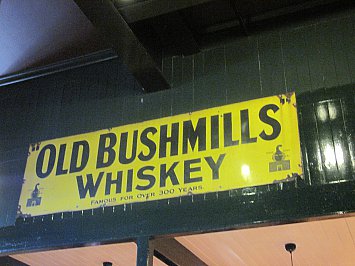
This is how every working week should start: it’s 10am on a Monday and already the aroma of fine Irish whiskey — people around here would say “the finest” — is filling our lungs.
Outside the North Atlantic crashes on ragged rocks and the wind whips over green fields, but here inside Bushmills Distillery on the northern coast of Northern Ireland the air is warm, sweet and heady.
In the town of the same name in County Antrim, and employing a significant number of the local population of 1300, Bushmills boasts being the world’s oldest working whiskey distillery. In 2008 it celebrated its 400th birthday and, needless to say, created a special blend — the 1608 — to mark the occasion.
After a tour of the premises, tapping at oak barrels and being struck woozy by the aroma and statistics (thousand of bottles produced every day), we sit and sample various Bushmills blends.
By way of comparison we are presented with samples of smoky Scotch and sour bourbon, but although I can appreciate the Bushmills Original, the Black Bush and the 16-year old blends, it is the 10-year old I keep coming back to. Smooth, warming and gentle. We discuss palates and preferences, and how to best appreciate the liquor of life in the glass before us.
To be honest, the previous night I got in some preparation.
At the historic but luxurious Bushmills Inn — the dark panelled bar at the front dates back to the 17th century; the award-winning restaurant, and rooms with four-posters and flat screens rather more recent — I sampled some Bushmills as I considered the day and our location.
The area around Bushmills is fascinating and even if the local whiskey isn’t your tipple — I can’t imagine why it wouldn’t be — then this remote and raw coastline holds many other rewards: the famous Giant’s Causeway (a World Heritage Site) is just minutes away, as are the dramatic ruins of Dunluce Castle on a headland where the cliff drops sharply into the roiling sea 30 metres below.
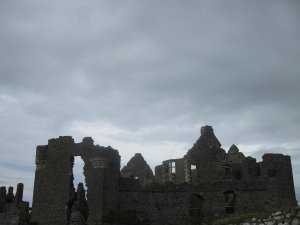
The original fortress on this commanding site was built by the Normans in the 12th century, the MacDonnells put up everything you can see today in the 16th and 17th centuries. The whole area was much modified down the centuries.
But the only access to the castle -- unless you can scale sheer cliffs and then slippery block walls -- was across a narrow and easily defendable bridge.
Little wonder this windblown place was impenetrable.
In the 17th century a manor house was built within the old walls, one of which crashed during a grand dinner in 1639 and the Duchess, who hated the sound of the sea anyway, decided enough was enough.
By the late 17th century Dunluce was no longer a MacDonnell favourite and so the castle fell into slow but relentless disrepair.
But it remains a remarkable sight on this fascinating coastline.
In nearby Ballycastle is a small museum with an unexpectedly interesting collection.
Ballycastle was a small port town until Captain Hugh Boyd (1690 - 1765) took it in hand and made it almost his private project: he had inherited the local estate in 1711 and within 25 years had control of the saltworks, and had started developing the harbour, the local linen works and many other cottage industries. He also built the elegantly Georgian-style Holy Trinity Church on Castle St using local materials and tradespeople.
During the Arts and Crafts Movement there were numerous Home Industries Workshops here which were internationally recognised (notably at the 1904 World Fair in St Louis), and Marconi sent his first radio signals of commercial information over the sea from the isle of Rathlin to Ballycastle.
Around 5000 US troops were stationed here for training in advance of the D-Day invasion because one of the local beaches, White Park Bay, bore a useful resemblance to the one in France where they were to land.
The Troubles meant this beautiful area went largely untouched by developers for decades, which explains why today you can amble through picturesque fishing villages and along coastlines which look much as they did centuries ago.
Ballycastle is peculiarly rich in history -- it is almost exclusively Georgian above “the Diamond” where three roads meet, and Victorian below -- and you won’t go short of a drink: I counted six pubs on a 100 metre stretch of Castle and Ann Streets.
Not that I needed one. I’d started the day at Bushmills Distillery.
For other travel stories by Graham Reid, see here for his two award-winning travel books.


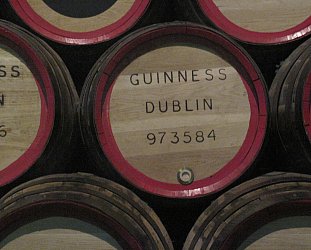
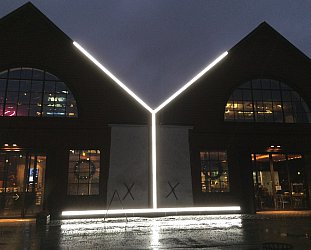
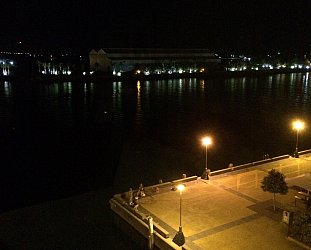


mark robinson - Nov 8, 2009
I have fond and vivid memories of a wet, cold day spent ambling at the distillery and striding across rocks at The Gialnts Causeway back in the early 1990s. Single malt scotch is right up there on my list of nice things to consume. at the time of writing Talisker is my favorite tipple.
Savepost a comment